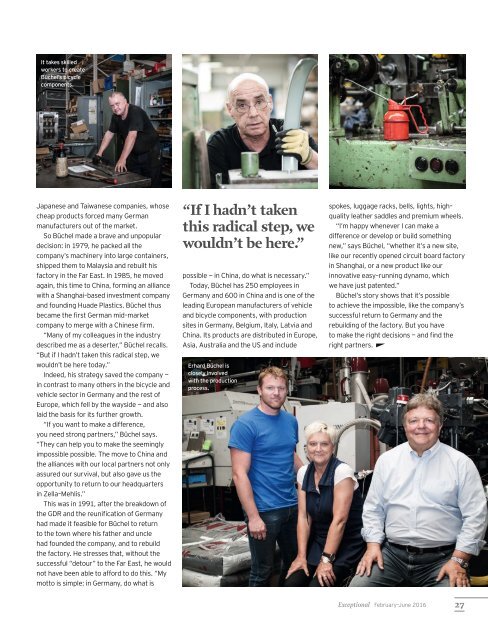Exceptional
ey-exceptional-2016-uki-book
ey-exceptional-2016-uki-book
Create successful ePaper yourself
Turn your PDF publications into a flip-book with our unique Google optimized e-Paper software.
It takes skilled<br />
workers to create<br />
Büchel’s bicycle<br />
components.<br />
Japanese and Taiwanese companies, whose<br />
cheap products forced many German<br />
manufacturers out of the market.<br />
So Büchel made a brave and unpopular<br />
decision: in 1979, he packed all the<br />
company’s machinery into large containers,<br />
shipped them to Malaysia and rebuilt his<br />
factory in the Far East. In 1985, he moved<br />
again, this time to China, forming an alliance<br />
with a Shanghai–based investment company<br />
and founding Huade Plastics. Büchel thus<br />
became the first German mid–market<br />
company to merge with a Chinese firm.<br />
“Many of my colleagues in the industry<br />
described me as a deserter,” Büchel recalls.<br />
“But if I hadn’t taken this radical step, we<br />
wouldn’t be here today.”<br />
Indeed, his strategy saved the company —<br />
in contrast to many others in the bicycle and<br />
vehicle sector in Germany and the rest of<br />
Europe, which fell by the wayside — and also<br />
laid the basis for its further growth.<br />
“If you want to make a difference,<br />
you need strong partners,” Büchel says.<br />
“They can help you to make the seemingly<br />
impossible possible. The move to China and<br />
the alliances with our local partners not only<br />
assured our survival, but also gave us the<br />
opportunity to return to our headquarters<br />
in Zella–Mehlis.”<br />
This was in 1991, after the breakdown of<br />
the GDR and the reunification of Germany<br />
had made it feasible for Büchel to return<br />
to the town where his father and uncle<br />
had founded the company, and to rebuild<br />
the factory. He stresses that, without the<br />
successful “detour” to the Far East, he would<br />
not have been able to afford to do this. “My<br />
motto is simple: in Germany, do what is<br />
“If I hadn’t taken<br />
this radical step, we<br />
wouldn’t be here.”<br />
possible — in China, do what is necessary.”<br />
Today, Büchel has 250 employees in<br />
Germany and 600 in China and is one of the<br />
leading European manufacturers of vehicle<br />
and bicycle components, with production<br />
sites in Germany, Belgium, Italy, Latvia and<br />
China. Its products are distributed in Europe,<br />
Asia, Australia and the US and include<br />
Erhard Büchel is<br />
closely involved<br />
with the production<br />
process.<br />
spokes, luggage racks, bells, lights, high–<br />
quality leather saddles and premium wheels.<br />
“I’m happy whenever I can make a<br />
difference or develop or build something<br />
new,” says Büchel, “whether it’s a new site,<br />
like our recently opened circuit board factory<br />
in Shanghai, or a new product like our<br />
innovative easy–running dynamo, which<br />
we have just patented.”<br />
Büchel’s story shows that it’s possible<br />
to achieve the impossible, like the company’s<br />
successful return to Germany and the<br />
rebuilding of the factory. But you have<br />
to make the right decisions — and find the<br />
right partners.<br />
<strong>Exceptional</strong> February–June 2016 27


